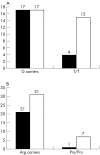Impact of the MDM2 SNP309 and p53 Arg72Pro polymorphism on age of tumour onset in Li-Fraumeni syndrome
- PMID: 16258005
- PMCID: PMC1904480
- DOI: 10.1136/jmg.2005.037952
Impact of the MDM2 SNP309 and p53 Arg72Pro polymorphism on age of tumour onset in Li-Fraumeni syndrome
Abstract
Li-Fraumeni syndrome, resulting from p53 (TP53) germline mutations, represents one of the most devastating genetic predispositions to cancer. Recently, the MDM2 SNP309 (T-->G variation) was shown to be associated with accelerated tumour formation in p53 mutation carriers. The impact of the common p53 codon 72 polymorphism on cancer risk remains controversial. We therefore investigated the effect of these two polymorphisms in 61 French carriers of the p53 germline mutation. The mean age of tumour onset in MDMD2 SNP309 G allele carriers (19.6 years) was significantly different from that observed in patients homozygous for the T allele (29.9 years, p<0.05). For the p53 codon 72 polymorphism, the mean age of tumour onset in Arg allele carriers (21.8 years) was also different from that of Pro/Pro patients (34.4 years, p<0.05). We observed a cumulative effect of both polymorphisms because the mean ages of tumour onset in carriers of the MDM2G and p53Arg alleles (16.9 years) and those with the MDM2T/T and p53Pro/Pro genotypes (43 years) were clearly different (p<0.02). Therefore, our results confirm the impact of the MDM2 SNP309 G allele on the age of tumour onset in germline p53 mutation carriers, and suggest that this effect may be amplified by the p53 72Arg allele. Polymorphisms affecting p53 degradation therefore represent one of the rare examples of modifier genetic factors identified to date in mendelian predispositions to cancer.
Conflict of interest statement
Competing interests: there are no competing interests
Similar articles
-
The single-nucleotide polymorphism 309 in the MDM2 gene contributes to the Li-Fraumeni syndrome and related phenotypes.Eur J Hum Genet. 2007 Jan;15(1):110-4. doi: 10.1038/sj.ejhg.5201715. Epub 2006 Sep 27. Eur J Hum Genet. 2007. PMID: 17003841
-
TP53 PIN3 and MDM2 SNP309 polymorphisms as genetic modifiers in the Li-Fraumeni syndrome: impact on age at first diagnosis.J Med Genet. 2009 Nov;46(11):766-72. doi: 10.1136/jmg.2009.066704. Epub 2009 Jun 18. J Med Genet. 2009. PMID: 19542078
-
Evaluation of TP53 Pro72Arg and MDM2 SNP285-SNP309 polymorphisms in an Italian cohort of LFS suggestive patients lacking identifiable TP53 germline mutations.Fam Cancer. 2016 Oct;15(4):635-43. doi: 10.1007/s10689-016-9895-3. Fam Cancer. 2016. PMID: 26956143
-
[Germline mutations of the p53 gene].Pathol Biol (Paris). 1997 Dec;45(10):845-51. Pathol Biol (Paris). 1997. PMID: 9769948 Review. French.
-
Li-Fraumeni syndrome: cancer risk assessment and clinical management.Nat Rev Clin Oncol. 2014 May;11(5):260-71. doi: 10.1038/nrclinonc.2014.41. Epub 2014 Mar 18. Nat Rev Clin Oncol. 2014. PMID: 24642672 Review.
Cited by
-
Age at cancer onset in germline TP53 mutation carriers: association with polymorphisms in predicted G-quadruplex structures.Carcinogenesis. 2014 Apr;35(4):807-15. doi: 10.1093/carcin/bgt381. Epub 2013 Dec 11. Carcinogenesis. 2014. PMID: 24336192 Free PMC article.
-
Genetic variants in germline TP53 and MDM2 SNP309 are not associated with early onset colorectal cancer.J Surg Oncol. 2008 Jun 1;97(7):621-5. doi: 10.1002/jso.20996. J Surg Oncol. 2008. PMID: 18381604 Free PMC article.
-
Towards an understanding of the role of p53 in adrenocortical carcinogenesis.Mol Cell Endocrinol. 2012 Mar 31;351(1):101-10. doi: 10.1016/j.mce.2011.09.010. Epub 2011 Sep 10. Mol Cell Endocrinol. 2012. PMID: 21930187 Free PMC article. Review.
-
The Pro allele of the p53 codon 72 polymorphism is associated with decreased intratumoral expression of BAX and p21, and increased breast cancer risk.PLoS One. 2012;7(10):e47325. doi: 10.1371/journal.pone.0047325. Epub 2012 Oct 10. PLoS One. 2012. PMID: 23071787 Free PMC article.
-
Blockade of MDM2 with inactive Cas9 prevents epithelial to mesenchymal transition in retinal pigment epithelial cells.Lab Invest. 2019 Dec;99(12):1874-1886. doi: 10.1038/s41374-019-0307-9. Epub 2019 Aug 22. Lab Invest. 2019. PMID: 31439892
References
-
- Chompret A. The Li‐Fraumeni syndrome. Biochimie 20028475–82. - PubMed
-
- Varley J M. Germline TP53 mutations and Li‐Fraumeni syndrome. Hum Mutat 200321313–320. - PubMed
-
- Bond G L, Hu W, Bond E E, Robins H, Lutzker S G, Arva N C, Bargonetti J, Bartel F, Taubert H, Wuerl P, Onel K, Yip L, Hwang S J, Strong L C, Lozano G, Levine A J. A single nucleotide polymorphism in the MDM2 promoter attenuates the p53 tumor suppressor pathway and accelerates tumor formation in humans. Cell 2004119591–602. - PubMed
-
- Bond G L, Hu W, Levine A. A single nucleotide polymorphism in the MDM2 gene: from a molecular and cellular explanation to clinical effect. Cancer Res 2005655481–5484. - PubMed
-
- Dumont P, Leu J I, Della Pietra A C, 3rd, George D L, Murphy M. he codon 72 polymorphic variants of p53 have markedly different apoptotic potential. Nat Genet 200333357–365. - PubMed
Publication types
MeSH terms
Substances
LinkOut - more resources
Full Text Sources
Research Materials
Miscellaneous

